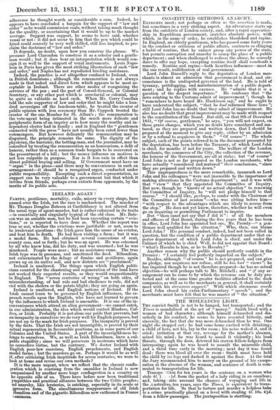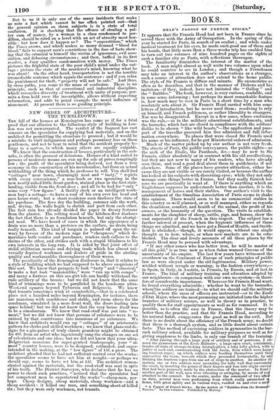THE MISLEADING LIGHT.
THE convict Smith is not to be hanged, but transported ; and the Times is scandalized at the act of " mercy." Smith lived with a woman of bad character ; although himself debauched and dis- orderly in his conduct, he seems to have resented bitterly, and sincerely, the fact that she was more debauched than he was. One night she stopped out; he had come home excited with drinking; a child of hers, not his, lay in the room ; his noise waked it, and it cried ; irritation at that cry, revenge for the mother's absence, seized his mind ; he was heard to assail it violently ; his loud threats, through the door, deterred his craven fellow-lodgers from interposing; again he was heard to assault the miserable child, and a third time early in the morning ; next day it was found dead : there was blood all over the room : Smith must have held the child by its legs and dashed it against the floor. At the trial the Jury recommended him to mercy on the ground of his exaspe- ration at the absence of the woman, and sentence of death is com- muted to transportation for life. Transpo—tion for ten years is the sentence on a woman who stole 4/. 1. rid. ',id. from the pocket of a lady riding in an omnibus; and, taking :auto account the chances of voyaging and life in the Australias, ten years, says the Times, is equivalent to trans- portation for life. So that to torture and murder a helpless babe is a crime practically placed on a level with stealing 4/. 10s. 4td. from a fellow-passenger. The juxtaposition is startling. But to ns it is only one of the many incidents that make us note a fact which cannot be too often pointed out—that the general opinion on these subjects is in a state of total confusion. It is shocking that the offence of stealing a pal- try, sum of money, by a woman in a class condemned to per- dition, should be rated on a level with an act of atrocity most hor- rible : but how does it happen so ? The " superstition," which the Times avows, and which makes so many demand "blood for blood," fails to support men's convictions in the face of facts show- ing that the criminal is himself the victim of ignorance, evil asso- ciation, and debasing circumstances ; and then, baffled in its first resolve, a Jury qualifies condemnation with mercy. The Times pictures the frightful state of the poor child's mind under the out- rage : picture the state of the murderer's mind, knowing what he was about ! On the other hand, transportation is not the terrible irremediable sentence which appals the senteneer ; and ifyou relax the punishment for theft, "property will not be safe." And thus, by cross paths, you come to the maze of confusion. There is no principle, such as that of correctional and industrial discipline, which reconciles diversity of treatment with unity of purpose, per- mits a firm hold over the incorrigible, allows without expecting atonement. ation, Aantdpreadsedsnt tteliepreenials neoxamNilnegthpe nicioprlal e. influence of
























 Previous page
Previous page